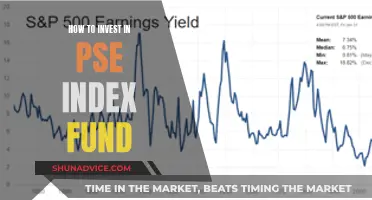
Money market funds are a type of mutual fund that invests in highly liquid, near-term instruments such as cash, cash equivalents, and debt-based securities with short-term maturity. They are intended to offer investors high liquidity with a very low level of risk. Money market funds are also called money market mutual funds and are insured by the Securities Investor Protection Corporation (SIPC).
Money market funds are considered extremely low-risk and are a good option for investors who want to park their excess cash temporarily before investing elsewhere or making an anticipated cash outlay. They are not suitable, however, for long-term investment goals like retirement planning as they don't offer much capital appreciation.
By investing excess cash in money market funds, investors can benefit from higher yields compared to traditional savings accounts while maintaining a high level of liquidity and low risk.
| Characteristics | Values |
|---|---|
| Type of Investment | Money Market Funds |
| Risk | Low |
| Returns | Low |
| Liquidity | High |
| Maturity | Short-term |
| Management | Actively Managed |
| Taxation | Taxable or Tax-free |
| Accessibility | Widely Accessible |
What You'll Learn

Money market funds are a type of mutual fund
Money market funds are considered extremely low-risk on the investment spectrum. They generate income but little capital appreciation. Money market funds can be used as a place to temporarily park money before investing elsewhere or making an anticipated cash outlay.
Money market funds work like a typical mutual fund. They issue redeemable units or shares to investors and are mandated to follow the guidelines drafted by financial regulators. While fund shareholders can typically withdraw their money at any time, there may be a limit on the number of times they can withdraw within a certain period.
The most common money market funds invest in government securities, tax-exempt municipal securities, and corporate and bank debt securities. An investment in a money market fund is not insured or guaranteed by the Federal Deposit Insurance Corporation (FDIC) or any other government agency. However, clients may be offered some protection by the non-profit Securities Investor Protection Corporation (SIPC).
Money market funds are intended to maintain a net asset value (NAV) of $1 per share, distributing any excess profits as dividends to shareholders. This requirement forces fund managers to make regular payments to investors, providing a regular flow of income. It also allows for easy calculation and tracking of the net gains generated by the fund.
Money market funds are a safe avenue for investing in secure and highly liquid, cash-equivalent, debt-based assets using smaller investment amounts. They are characterised as low-risk, low-return investments and are not suitable for long-term investment goals like retirement planning due to the lack of significant capital appreciation.
Mutual Funds: When to Hold Back on Investments
You may want to see also

They are low-risk, low-return investments
Money market funds are considered low-risk, low-return investments. They are a type of mutual fund that invests in highly liquid, short-term debt instruments, such as government securities, tax-exempt municipal securities, and corporate and bank debt securities. These funds aim to maintain a net asset value (NAV) of $1 per share and distribute any excess profits as dividends to shareholders. While the returns are typically low, money market funds offer high liquidity and very low risk, making them suitable for investors seeking a conservative approach.
The low-risk nature of money market funds is due to their investment in highly liquid, short-term instruments. These instruments have a maturity period of less than 13 months and a weighted average maturity (WAM) of 60 days or less. This ensures that investors' money is not locked into long-term investments, providing easy access to their funds. Additionally, money market funds are insured by the Securities Investor Protection Corporation (SIPC), adding an extra layer of protection for investors.
Compared to other investment options, money market funds offer a more conservative approach with stable returns. While the returns may not be as high as riskier investments, money market funds provide consistent and modest income. They are suitable for investors who want to preserve their capital and generate a steady income without taking on significant risk.
Money market funds are an attractive option for investors who want to park their excess cash temporarily. They can be used as a short-term investment vehicle before investing in other opportunities or making anticipated cash outlays. For example, investors might choose to invest in money market funds while waiting for more favourable market conditions or identifying other investment options.
In summary, money market funds are low-risk, low-return investments that offer high liquidity and capital preservation. They are suitable for investors seeking a conservative approach, a temporary parking spot for their excess cash, or a consistent and modest income stream.
Robo Advisors: Index Fund Investing Strategies Explored
You may want to see also

Money market funds are highly liquid
- Cash equivalent securities
- High-credit-rating, debt-based securities with short-term maturity (such as US Treasuries)
- Bankers' Acceptances (BA)
- Certificates of deposit (CDs)
- Commercial paper
- Repurchase agreements (Repo)
Money market funds are intended to offer investors high liquidity with a very low level of risk. Money can be withdrawn immediately or with one-day notice. However, fund shareholders may have a limit on the number of times they can withdraw within a certain period.
The high liquidity of money market funds means that they are suitable for investors who want to park their money temporarily before investing elsewhere or making an anticipated cash outlay.
Emergency Fund Strategies: Philippines Investment Options
You may want to see also

They are insured by the Securities Investor Protection Corporation (SIPC)
Money market funds are insured by the Securities Investor Protection Corporation (SIPC), a federally mandated, non-profit, member-funded, US government corporation. The SIPC was created in 1970 under the Securities Investor Protection Act (SIPA) to protect investors in the event of their brokerage firm failing financially.
The SIPC has a Board of Directors that determines its operational policies. The board consists of seven members, two of whom are appointed by the Secretary of the Treasury and the Federal Reserve Board. The remaining five members are appointed by the President, with the advice and consent of the Senate. The SIPC acts as an insurance policy, providing brokerage customers with up to $500,000 in coverage for cash and securities held by the firm, with a limit of $250,000 for cash.
The SIPC steps in when a brokerage firm fails financially and assets are missing from customer accounts. It works to restore investors' assets and has recovered billions of dollars for investors over its 50-year history. The SIPC is not a government agency and does not investigate fraud or securities crimes. It is funded by its members and interest from US government securities.
The SIPC provides protection for investors in money market funds, ensuring that their assets are protected in the event of the fund's failure. This insurance coverage adds to the stability and security of money market funds, making them a relatively safe and attractive investment option for individuals looking to invest their excess cash.
Tax Managed Mutual Funds: When to Invest for Maximum Benefits
You may want to see also

Money market funds are not the same as money market accounts
Nature of the Product
Money market accounts are a type of savings account offered by financial institutions, whereas money market funds are investment products offered by investment fund companies or brokerage firms. Money market accounts are also referred to as money market deposit accounts, while money market funds are sometimes called money market mutual funds.
Risk and Returns
Money market accounts are considered low-risk because they are FDIC-insured (up to $250,000 per depositor) and offer a stated interest rate. In contrast, money market funds are not federally insured and carry a small amount of risk, although they are still considered low-risk investments. Money market funds invest in short-term, low-risk securities and aim to maintain a net asset value (NAV) of $1 per share, but there is no guarantee that investors will not lose money.
Accessibility
Money market accounts offer more accessibility to funds as they often come with a debit card or check-writing privileges. On the other hand, money market funds do not provide direct access to funds, and investors usually have to initiate a transfer from their brokerage account, which may take a few business days.
Transaction Limits
Money market accounts typically have transaction limits, such as a restriction of six withdrawals per billing statement period. Money market funds, however, do not have explicit transaction limits, although investors may have a limit on the number of times they can withdraw funds within a certain period.
Fees
While money market accounts may have monthly maintenance fees, money market funds have management fees, also known as expense ratios, which are deducted from the investor's earnings.
Suitability
Money market accounts are well-suited for emergency funds and short-term savings goals due to their liquidity and earning potential. In contrast, money market funds are often used by investors looking for a short-term, low-risk yield while waiting for other investment opportunities.
Mutual Fund Investment: Current Smart Choices
You may want to see also
Frequently asked questions
Money market funds are a good place to temporarily park money that you plan to invest elsewhere or spend in the short term. They are considered extremely low-risk and aim to maintain a net asset value of $1 per share.
Money market funds are a safe, liquid investment option. They are insured by the Securities Investor Protection Corporation (SIPC) and offer high liquidity with a very low level of risk.
Money market funds are sensitive to interest rate fluctuations and monetary policy. They also offer little capital appreciation.
Some alternatives to money market funds include brokered certificates of deposit (CDs), checking accounts with interest, treasury bills and notes, and bonds.







